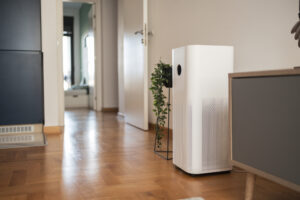We often focus on outdoor pollution, but indoor air quality can be just as important. From respiratory irritants to mold growth, several hidden factors could be affecting your health without you even realizing it. Here’s how to identify and tackle the common signs of poor indoor air quality with tips from the experts at Superb Heating & Air.
Persistent Respiratory Symptoms? It Could Be Your Air
One of the earliest signs of poor indoor air quality is the onset or worsening of respiratory symptoms. If you or your family members experience constant coughing, sneezing, or shortness of breath indoors, pollutants like dust, pet dander, or volatile organic compounds (VOCs) may be to blame.
Steps to Improve Respiratory Health
- Regular Cleaning: Dust and vacuum frequently to minimize allergen buildup.
- Air Purifiers: Invest in HEPA air purifiers to filter out particles that irritate the lungs.
- Proper Ventilation: Ensure your home has adequate airflow to prevent stagnant, polluted air.
Unpleasant Odors That Just Won’t Go Away
Lingering odors from sources like mold, tobacco smoke, and household cleaners are more than annoying—they may indicate poor air quality. Certain pollutants, especially VOCs from cleaning agents and paints, can emit harmful particles that contribute to these smells and compromise air quality.
How to Eliminate Odors and Freshen Indoor Air
- Activated Carbon Filters: Use air purifiers with activated carbon to absorb odors and VOCs.
- Natural Cleaning Products: Switch to low-VOC or natural cleaning products to reduce airborne toxins.
- Increase Ventilation: Open windows and doors regularly, especially after cooking or using strong-smelling products.
Excess Humidity: A Breeding Ground for Mold and Dust Mites
High humidity levels create an ideal environment for mold and dust mites, both of which can exacerbate allergies and respiratory issues. If you notice signs like damp walls or condensation on windows, it’s time to address humidity in your home.
Tips for Controlling Humidity Levels
- Use Dehumidifiers: In areas prone to moisture, such as bathrooms and basements, dehumidifiers help maintain optimal humidity.
- Check for Leaks: Regularly inspect for and repair leaks that can lead to hidden water damage and mold growth.
- Ventilation in Moisture-Prone Areas: Install or use exhaust fans in kitchens and bathrooms to keep humidity under control.
Increased Allergy or Asthma Symptoms Indoors
Poor indoor air quality can worsen asthma and allergy symptoms. Pollutants like pollen, pet dander, and dust mites often linger in indoor air, triggering or worsening allergic reactions. If you or your family members are frequently affected, consider that your indoor air might need improvement.
Strategies to Alleviate Allergens at Home
- HEPA Filters in HVAC Systems: Use HEPA filters in your HVAC system to trap allergens before they circulate.
- Frequent Cleaning: Regularly clean carpets, upholstery, and curtains to reduce allergens.
- Allergen-Proof Bedding: Use bedding covers designed to keep out dust mites, and wash linens weekly in hot water.
Visible Mold Growth: A Clear Sign of Air Quality Issues
Mold growth is not only an eyesore but also a health hazard, as it releases spores into the air that can cause respiratory problems and allergic reactions. If you see visible mold on surfaces, it’s crucial to act immediately to prevent further spread and health risks.
Addressing Mold for a Healthier Environment
- Identify and Remove Moisture Sources: Locate and fix leaks or sources of standing water to prevent future mold growth.
- Clean with Mold-Specific Products: Use specialized mold cleaners and ensure affected areas are thoroughly dried.
- Monitor Humidity: Keep indoor humidity between 30-50% to make the environment less favorable for mold.
Proactive Tips for a Healthier Indoor Environment
Beyond addressing specific issues, there are several steps you can take to create and maintain a healthier indoor space.
Ventilation and Fresh Air
- Exhaust Fans: Use exhaust fans in high-moisture areas to improve airflow.
- Open Windows: Bring fresh air into your home whenever possible, even in cooler weather, to refresh indoor air quality.
Maintain Your HVAC System
- Filter Replacement: Change your HVAC filters regularly to keep your system functioning efficiently.
- Professional Maintenance: Schedule regular HVAC maintenance with Superb Heating & Air to ensure it’s operating optimally and filtering air effectively.
Invest in Quality Air Purifiers
- HEPA and Carbon Filters: Choose air purifiers with HEPA and activated carbon filters to capture both particles and VOCs.
- Houseplants: Certain plants, like peace lilies and snake plants, can naturally improve indoor air by absorbing pollutants.
Protecting Your Health Through Better Indoor Air Quality
Maintaining good indoor air quality is essential for your family’s health and well-being. If you’re noticing any of these warning signs of poor air quality, it’s time to make improvements. For a professional assessment and customized solutions, contact Superb Heating & Air at (708) 890-8285. Our team is here to help you create a cleaner, safer, and more comfortable indoor environment.

